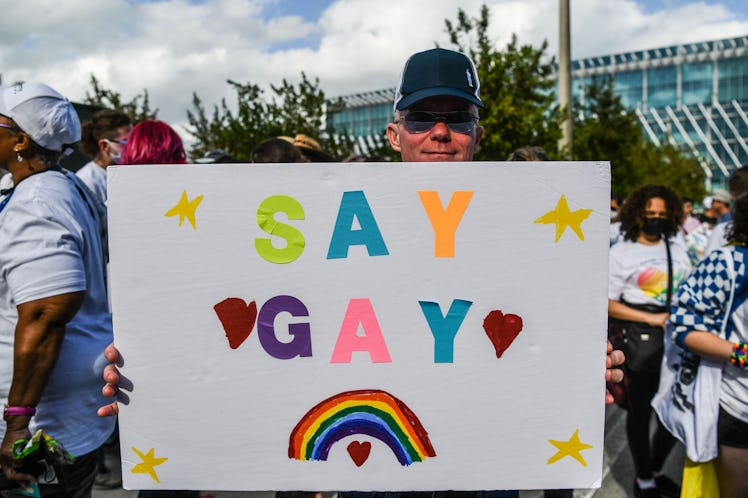
Great, More States Are Rolling Out "Don't Say Gay" Bills Now
Copycat laws are hitting the double-digits.
After Florida lawmakers passed House Bill 1557 (HB1557), otherwise known as the controversial “Don’t Say Gay” bill, in March, several states across the country are planning to introduce copycat legislation of their own. Lawmakers in Alabama, Ohio, Texas, and more are drafting up measures that would effectively constrain the instruction of LGBTQ+ issues in schools, which could have far-reaching implications for children, families, and educators. So, which states have “Don't Say Gay” bills in the works? There are too many.
Signed by Florida Governor Ron DeSantis on March 28, HB1557 — officially titled “Parental Rights in Education” — includes several key passages that would effectively censor discussion on LGBTQ+ topics within all grade levels. According to lines 97 through 101 in the bill, “classroom instruction by school personnel or third parties on sexual orientation or gender identity may not occur in kindergarten through grade 3 or in a manner that is not age appropriate or developmentally appropriate for students in accordance with state standards.” Much of the language in this new Florida measure is broad and vaguely written, as it not only prohibits “classroom instruction” on LGBTQ+ issues, but “classroom discussion” as well.
“We will make sure that parents can send their kids to school to get an education, not an indoctrination,” DeSantis said on March 28 as he signed the legislation. As of April 11, HB1557 has inspired several copycat measures in states across the country: Lawmakers in Alabama have already passed their anti-LGBTQ+ measure, while Georgia, Ohio, Louisiana, Arizona, Indiana, Oklahoma, Kansas, and Tennessee are currently filing similar anti-LGBTQ+ measures. In Texas, Governor Greg Abbott has stated he’d make it a “top priority” to pass a matching bill within the next legislative session.
But they’re not going unchallenged by the people most affected. Around the country, students have been fighting back against these “Don’t Say Gay” bills by organizing protests, sharing support for the LGBTQ+ community, and staging walkouts from school grounds. At one high school in Florida, an estimated 500 students walked out in early March in protest of the bill.
Critics have slammed the law for its harmful impact on LGBTQ+ children, their families, educators, and more. “Florida’s cruel ‘don’t say gay’ bill is one of hundreds of anti-LGBTQ bills moving through state legislatures, most of which primarily attack trans youth,” the American Civil Liberties Union wrote in a Feb. 23 tweet. “Censoring classroom discussions won’t keep kids from being LGBTQ. It just piles on to the national pattern of attacks.”
Indeed, this influx of copycat laws is part of a larger pattern of anti-LGBTQ+ legislation introduced by Republican lawmakers across the United States. According to a March 2022 report from the Human Rights campaign, researchers found that lawmakers have filed legislation for over 300 anti-LGBTQ+ laws in 2022 alone. So while Florida’s law will not officially take effect until July 1, it’s already having devastating consequences on the LGBTQ+ community.